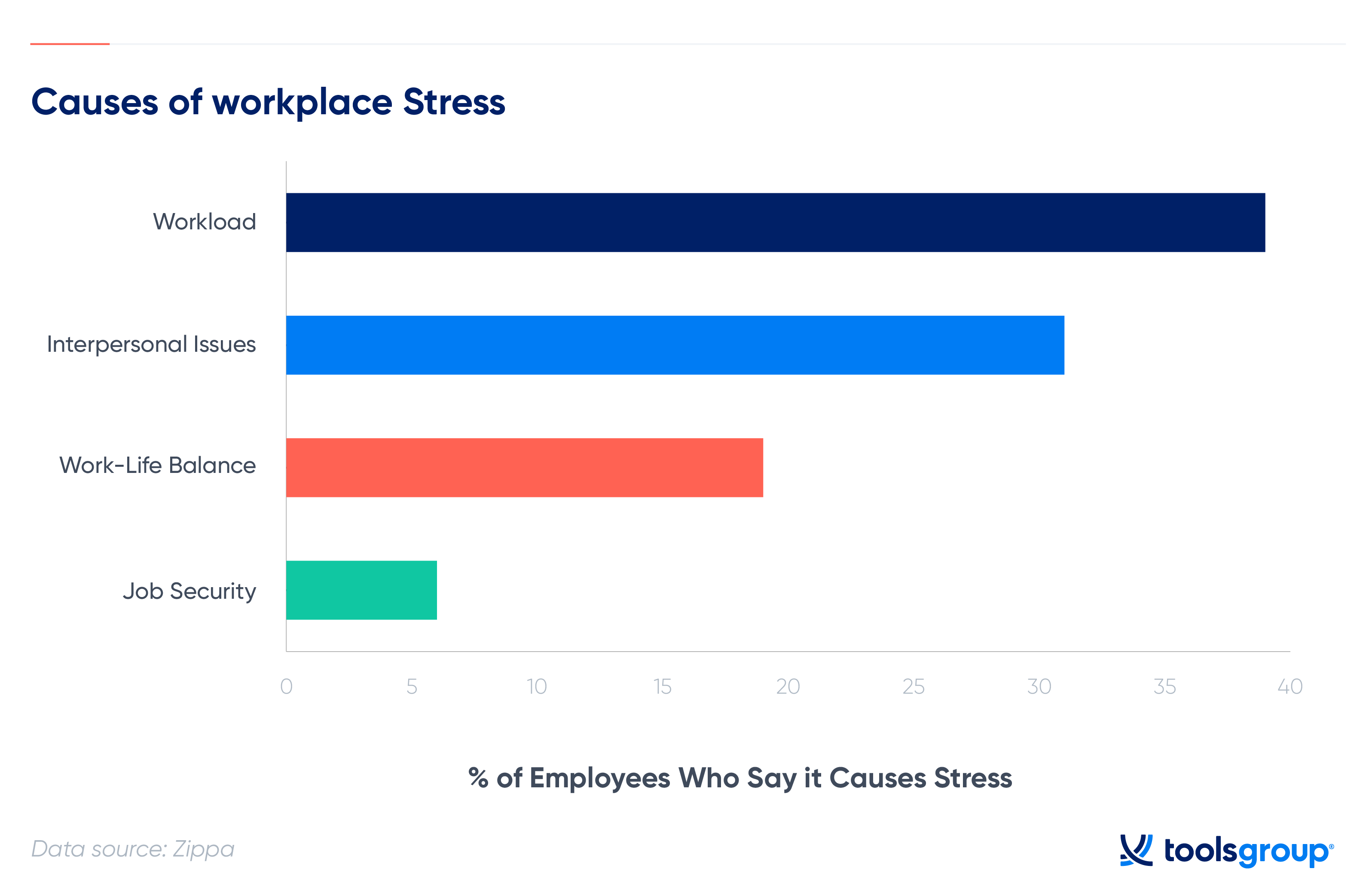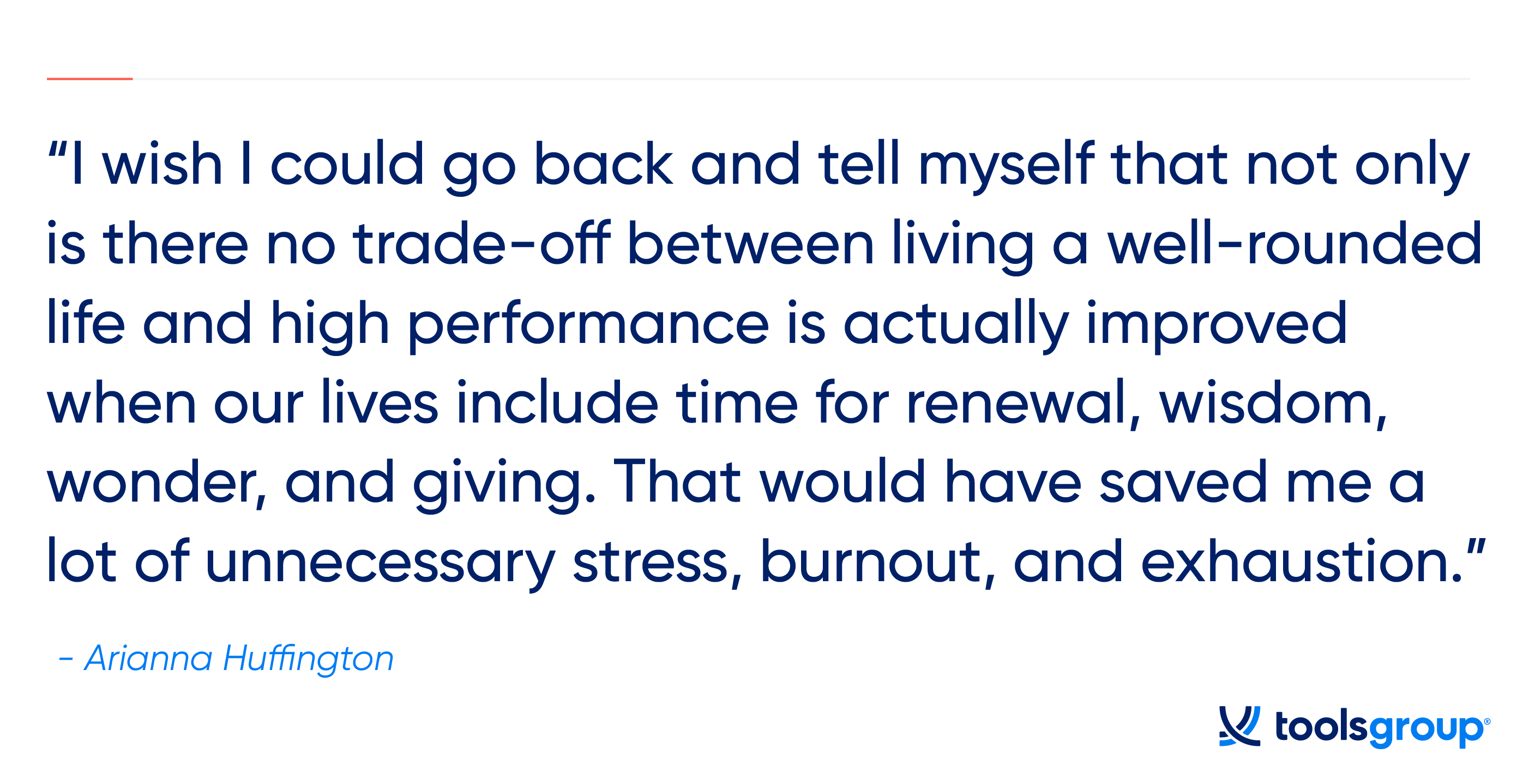Strategies for Managing Stress in the Workplace: Advice From 30 Experts Across the Globe
Workplace stress is nothing new.
Perhaps Tina Fey put it best in her wonderfully witty way, saying “I was a little excited but mostly blorft. ‘Blorft’ is an adjective I just made up that means ‘Completely overwhelmed but proceeding as if everything is fine and reacting to the stress with the torpor of a possum.’ I have been blorft every day for the past seven years.”
Raise your hand if you can relate. Okay, so I can’t see you, but I imagine if we were all together in a room, there would be a whole lot of hands in the air.
And plenty of us are feeling that stress at work. According to the American Psychological Association’s (APA) 2021 Work and Well-being survey, 71% of Americans feel tense or stressed during the workday.
Image source: APA
And while “Too much to do, too little time” has been around for centuries, Covid-19 has caused a shift in some types of work-related stress thanks to the rise of remote work.
And, Covid or not, other world events continue to cause additional anxiety that leaks into our jobs one way or another.
For example, as of March 2022, 81% of Americans say the supply chain is a significant source of stress.
As Tom Derry, CEO of the Institute for Supply Management, shared in PBS, “It’s been the hardest year for logistics and supply chain managers,” Pafford said. “They always say the most stressful job in the world is being an air traffic controller at any airport … I’d venture to say that being a supply chain manager is that — or worse — this year.”
These issues go beyond supply chain professionals to affect businesses of every size, keeping stress levels high even as pandemic rates seem to have gone down.
Add in inflation, family demands, the internal pressure we put on ourselves to succeed (thanks, social media…) and the general requirements that come with being an adult, and the lines of stressors from work and home start to blur and blend into each other.
Image source
Before the doom and gloom of the world – and work – start to get you down, take a breath (a long, slow, deep breath…. In…and out…there you go!) and remember: There are ways to keep your stress down, and you’re reading actionable ways to do it right now.
#Selfcare for the win.
(Actual) Strategies for Managing Stress in the Workplace
So. How do we deal? I mean, really – how do we not just say we’re going to find work/life balance, but actually reduce the stress in our lives to not just be more productive – and find that peace, joy, and fulfillment we all seek?
From medical professionals to managers, small business owners to entrepreneurs, these 30 expert insights are made to help you overcome stress to find the balance that, despite it being oh-so-hard to uncover, we all deserve to find.
And hey, when all else fails, think of the words of Ricky Gervais, “Relax. No one else knows what they’re doing either.”
Occupational Stress Symptoms
Among other things, the pandemic taught us how to have compassion, and see people as people (you know — real human beings), and to check in with our peers to make sure they’re okay.
It’s a practice we can – and should – continue to follow, particularly when considering the impact stress has on both our physical and mental health.
When it comes to symptoms to watch for, keep a caring eye out for the following (even if you’re remote). And, I’m no medical expert, but if you’re regularly experiencing them yourself, it might be time to do some soul-searching and act. (More on that later!)
The behavioral, mental, and physical symptoms of excessive workplace stress include:
-
Excess anxiety for continued periods
-
Trouble sleeping/lack of sleep
-
Tired eyes
-
Fatigue
-
Headaches
-
Upset stomach (I’ll leave the rest of that to your imagination…)
-
Tense and tired muscles
-
Loss of motivation or creativity
-
Feeling overwhelmed or depressed
-
Anger and irritability
-
Trouble concentrating
The APA study of work-related stress uncovered how the negative impacts of stress affect more than our health: Lower productivity, less effort, and a desire to quit all hurt morale and the productive work companies need to reach their business goals.
Image source: APA
While we all feel frustrations and the struggle to focus from time to time, persistent symptoms are signs of a problem.
Consider the following statistics compiled by the American Institute of Stress, demonstrating the physical symptoms of workplace stress:
-
62% of people finish the day with neck pain from work
-
44% report stressed-out eyes
-
34% have difficulty sleeping
-
19% have quit due to stress
-
12% complained of hand pain
So, now that we have an idea of what we’re looking for, let’s dive into what causes this stress and anxiety at work, and – more importantly – how we can take action to manage it.
8 Causes of Excessive Employee Work Stress
Without a doubt, study after study continues to show that an excessive workload is the number one factor that contributes to stress at work.
Consider the research by Zippia, demonstrating that 39% of employees report workload as their number one stressor, followed by interpersonal issues, work/life balance, and job security:
And it’s easy for that heavy workload to lead to burnout; with McKinsey data demonstrating the employee burnout felt around the world:
Data source: McKinsey
The triggers that cause stress vary from person to person, making it difficult to quantify based on a survey.
So let’s turn to some qualitative data. The following experts share eight sources of stress at work. While workload is indeed a factor, pressure often comes from people – be it managers, peers, or even our own insecurities.
1. Excessive and Heavy Workload
“According to research conducted by the Chartered Institute of Personnel and Development (CIPD), a heavy workload is the most common cause of stress at work. Unrealistic deadlines and excessive volume of work make people feel rushed and are a major source of pressure. Lack of support at the workplace can also lead to stress. Employees need interpersonal support from their managers, supervisors, and colleagues and good working relationships to not feel alone at work.”
Sai Blackbyrn, CEO, Coach Foundation
2. An Unhealthy or Toxic Company Culture
“Many work environments are infused with perfectionism and workaholism. This creates a toxic workplace culture in which employees don’t feel comfortable discussing their symptoms. Symptoms such as emotional exhaustion, physical exhaustion, and negative thinking are hard to spot in others – especially if they’re actively hiding it. The key things to look for are cynical attitudes (about oneself or others), keeping oneself isolated from coworkers, and any other signs that point to mounting inner struggles. At the end of the day, without creating a more accepting workplace culture, healthcare facilities won’t have the luxury of preventing burnout – but curing it after the fact.”
Tasha Holland-Kornegay, PhD, LCMHC, WIRL
3. The New Struggle for Work-Life Balance
“Individual demands in the office are increasingly reaching out into employees’ homes and social lives. Working long, uncertain, or unsocial hours, working away from home, bringing work home, high levels of responsibility, job uncertainty, and job relocation can all have a negative impact on family obligations and recreational activities. This is likely to jeopardize a decent and peaceful quality of life outside of work, which serves as a valuable buffer against work-related stress. Domestic stressors such as childcare duties, financial difficulties, bereavement, and housing issues may also have an impact on a person’s professional resilience.”
Andreas Velling, CMO, Fractory
4. Poor Communication Skills
“The great majority of workers and professionals place a premium on being able to communicate with others. Unfortunately, there will be some team members who are naturally bad communicators in almost every organization. When these folks are managers or work directly with you, this can be very aggravating. Poor communication can cause project goals and stages to become muddled, leading to project derailment. Getting back on track will require more work, which will lead to – you guessed it – more stress.”
Steve Pogson, Founder & E-commerce Strategy Lead, FirstPier
5. Workplace Relationships and Conflict with Co-Workers
“We spend more quality time with coworkers than our friends or family, and we have no say in who we work with. People are hired based on their abilities, not on their personality. And, undoubtedly, there will be conflict among coworkers.
“Many companies can be supportive environments. However, this is not always the case. Colleagues might be jealous of one another or become unhealthy competitors. If left uncontrolled, it can develop into bullying, intimidation, gossiping, or backstabbing.
“It’s excruciatingly unpleasant to go to work where a coworker’s behavior undermines you. It’s not always obvious, but a competent manager should always look for employee conflict.”
Dr. Elizabeth Lombardo, Ph.D., CEO, Global Keynote Speaker, and Concierge Coach
6. Lack of Employee Appreciation
“Being undervalued and/or under-appreciated is a major risk factor for the development of workplace stress. When people feel that their efforts are going unnoticed, they might push themselves too much at work to prove themselves, resulting in stress and burnout. Moreover, being consistently under-appreciated can lead to confidence and self-esteem issues, as well as anger and anxiety problems, further worsening the situation.”
Doug Pierce, Chief Marketing Officer, Sigma Computing
7. Fear of Failure
“One of the biggest yet most underestimated causes of stress in the workplace is a pervasive fear of failure, where nobody in the office wants to consider the possibility of screwing up. And this is something that is especially prevalent in most high-pressure corporate settings, where performance metrics are everything and survival often comes down to how well you perform and how consistently you do what is expected of you.
“This sort of work culture often ends up creating a complete lack of psychological safety, which ultimately results in an increase in workplace stress, frustration, and anxiety. In this respect, it is important that business leaders work to avoid introducing ambiguous job expectations in the workplace by reassessing KPIs, in order to ease their employees’ workplace pressure.”
Kathleen Ahmmed, Co-founder, USCarJunker
“Most people do not like to disappoint others, and sometimes our work environment is unpredictable, which can cause an overwhelming sense of stress and anxiety. We are afraid of losing our jobs from mistakes that can happen, and we sometimes forget that we are all human and will make mistakes.
“Imposter syndrome, when we feel we are not qualified enough for our job and we fear someone will find this out, is very common in the workplace. This is rooted from a lack of self-confidence and anxiety surrounding the workplace.”
Alexander Burgemeester, Neuropsychologist, Owner of The Narcissistic Life
8. Micromanagement and a Lack of Autonomy
“The common causes of stress at work include strict deadlines, long work hours, no autonomy, mundane tasks, policy changes, and strict schedules. Of these, the lack of autonomy can be the most significant stressor in the workplace. This is because you are constantly being monitored and scrutinized for your work. As the employer’s leadership style involves micromanagement, it can reduce your productivity and lower your morale. So, this excessive supervision can become a headache during office hours.”
Dr. Lea McMahon LPC, EdD, Chief Clinical Officer, Symetria Recovery
*The most common cause of stress is individual differences on how the highest level of productivity is achieved. For some people, the highest level of productivity is achieved when working from a set office hours while for other people, productivity is not dependent on time, rather some even feel most productive during the wee hours of the day. These differences create misunderstandings, arguments, and sometimes helicopter bosses.”
Will Tigerton, Financial Analyst & Founder, LeanBack Player
Now that we’ve got the causes down (perhaps one or two of those resonated with you), let’s look at how company management can help employees alleviate their anxieties and pressure points.
How Companies and Managers Can Help Employees Manage Work Stress
The importance of company morale has been preached for decades. And, in light of the labor shortage, businesses have taken even more steps to improve employee retention and company culture.
Whatever company policies say, staff stress levels often have a direct correlation to their manager.
Leaders can help employees cope (and thrive!) by creating an environment that is supportive, allows open communication, and fosters trust.
Here are some ways leaders are putting these theories and more into practice.
1. Use Communication and Flexibility to Create a Culture of Compassion
“Employers can help employees manage stress in the workplace by proactively re-delegating when individuals have their hands full. When employees feel stressed or overworked, the first thing that they should do is reach out to their supervisor before the problem escalates. However, this is easier said than done.
Many employees are afraid that it could reflect poorly or show weakness when they ask for a helping hand. Therefore, the onus is on employers to create a culture that celebrates honesty and shows employees that it’s okay to put their mental health first.”
Mike Grossman, CEO, GoodHire
“One of the best ways to help employees manage stress is by making them feel heard. Make sure that your employees trust you and can easily voice their concerns. Employers should directly talk to the employees if they notice low productivity or any other change in their behavior. Setting up an HR department that is responsive, effective, and compassionate is crucial in making a safe office space.”
Steve Anevski, Co-Founder, Up Shift Work
“The most important thing to me is being someone my employees can talk to. I don’t pry if it is something sensitive like mental health, but I make sure they are met with compassion in the form of changing their hours to something more suitable, giving them time off, assigning difficult tasks to someone else, etc. Employees are also given a couple of “CEO” days each month when they can take time off for whatever reason—no questions asked. This is on top of their vacation days and sick leave.”
Leslie Gilmour, Managing Director, Cube Digital
2. Help Employees Connect With Co-Workers
*Hosting weekly meetups can make employees more comfortable in the office and help them build connections with their coworkers. Spending time in a weekly activity, even something as simple as a puzzle, will ease stress and increase employee morale.
For remote employees, having daily phone calls and video chats will keep people connected and more present in their position. Going no contact, except when there is an issue, has negative psychological effects on employees. It conditions them to dread when they have to talk to their superiors and coworkers.”
Bryan Philips, Head of Marketing, In Motion Marketing
“The independent nature of the remote workspace can sometimes feel overwhelming. Employees may be hesitant to reach out when they don’t really know their co-workers. Lack of communication can lead to mistakes, missed deadlines, and derailed projects. Inclusive leaders bring people together and build a sense of community within their organization. They do so because team bonding is a huge key to finding better levels of productive collaboration.
“If you can create micro-connections between team members, they’ll feel more comfortable asking for help, offering assistance, and working together on projects in the virtual workplace. Small group chats, a few minutes of socializing before a Zoom meeting starts, and after-hour virtual get-togethers, can help employees get to know one other more and help you identify people who seem to hit it off. Inclusion drives better collaboration, which lets all team members know that they don’t carry all the weight on their shoulders.”
Chris Gadek, Vice-President of Growth, AdQuick
3. Implement Time Management Software
“Using time management software to evaluate how long it takes to finish a task on average is one approach to ensure that the deadlines you set are not unrealistic. The deadlines you set can then be based on this average, ensuring that team members aren’t rushing to complete a critical task that requires a little extra time.”
Daniel Foley, Marketing & SEO Specialist, Emma Sleep
4. Automate Tedious Tasks and Boring Work
“Although unexpected, a notable source of work-related stress comes from boring or uninspiring work. If employees feel that their responsibilities are monotonous, repetitive, or don’t serve an important purpose, it can rapidly demoralize your workforce. This tends to manifest in the form of irritability, disinterest, and worse communication – all of which culminate in higher employee turnover as your organization’s culture takes a hit.
This happens for one simple reason: Humans are goal-setting creatures. People love approaching difficult challenges and finding ways to overcome them. This is necessary for both personal and professional development and should be present in any future-focused workplace. As an employer, it’s not always easy to delegate responsibilities effectively. What one person considers an exciting challenge, another might perceive as dull and routine.
The solution is to give employees a say in what they do: To make sure that your team feels passionate about what they do, create an environment where employees have more of an input in terms of their duties. With their feedback, give your team autonomy over tasks they believe truly matter. Then, automate the tasks that don’t. This shows your team that you’re invested in minimizing work-related stress and helping employees play to their strengths — both of which have an immediate effect on your team’s overall wellbeing and level of engagement.”
Patrick Casey, Director of Growth Marketing, Felix Health
5. Support Time Off and Employees Who Set Boundaries
“Respect employee time off of work. For as long as it isn’t an urgent matter, avoid disturbing them outside of working hours. In this way, they can focus more on their personal lives and relax without being bothered because of your un-urgent issues.”
Connor Brown, Founder, After School Finance
6. Give Employees the Freedom to Fail
This bonus tip comes from yours truly. As one of those people who has indeed felt the self-induced stress that comes from a fear of failure, I can tell you, without a doubt, managers have a huge impact on how high those stress levels – and the associated workload – go based on the pressure for perfection.
Almost any leader will tell you that it’s okay to make mistakes, as long as you learn from them. And we know they are necessary for innovation. I mean, take your pick of the Albert Einstein quotes illustrating the need to embrace mistakes:
-
“Failure is success in progress,”
-
“Anyone who has never made a mistake has never tried anything new,” or, my favorite:
-
“You never fail until you stop trying.”
But, despite these words of wisdom from one of the greatest innovators who ever lived, here’s the thing: According to a study by DDI, only 7% of leaders say failure is strongly embraced for innovation.
In addition to losing the innovative ideas (and passion!) that come from the freedom to fail, a culture of perfectionism leads to an excessive workload, a lack of trust in talking to management, and burnout which results in – yup, you guessed it – more mistakes. Allowing employees to make mistakes not only relieves stress and builds trust, it leads to better results – making you (ta-da!) look like the amazing manager you are.
9 Stress Management Strategies to Overcome Burnout
So. We’ve covered the sources of stress, and how management can help, but what about ourselves?
In the words of Dragos Badea, CEO of Yarooms, “No amount of meditation apps, bath bombs, or yoga is going to help if the underlying issue is not addressed – you’ll just be buying time.”
I’ve learned the hard way that perfectionist tendencies can lead to endless revisions – and diminishing return on time. (And family members whose annoyance turns into hanger as they wait 5 minutes 50 minutes for you to join them at the dinner table. Oops.)
Changing our self-imposed habits is far from easy, but to relieve the stress, it’s important to recognize what we have the power to control – and where we can change.
In the words of Arianna Huffington (who literally passed out, fell, and woke up in a pool of her own blood due to exhaustion from 18 hour workdays), “I wish I could go back and tell myself that not only is there no trade-off between living a well-rounded life and high performance is actually improved when our lives include time for renewal, wisdom, wonder, and giving. That would have saved me a lot of unnecessary stress, burnout, and exhaustion.”
In the end, part of overcoming our stress depends on taking responsibility for our decisions. Setting boundaries is never easy – no one likes saying no – and it’s a skill that may take some practicing.
Here are the nine strategies you can practice and look to employ in your own life.
1. Establish Your Boundaries
“Establish healthy boundaries with your managers early on and stand your ground on them. Your manager often faces pressure from higher-ups to maximize their team’s performance and meet impossible deadlines, which they then place on you. Some managers will push you as far as you let them, not because they’re bad people, but because they know you’re reliable. When you start setting boundaries with your manager and letting them know that you feel overloaded, you’d be surprised with how many of them respect it. Once they learn your boundaries, it’s easier for them to ask someone else rather than push you to do the extra work.”
John Li, Co-Founder & CTO, Fig Loans
2. Set Time to Disconnect
“We need time to refill and return to our pre-stress level of functioning in order to avoid the detrimental impacts of chronic stress and burnout. This healing process necessitates switching off from work for periods of time during which you are not engaged in job-related activities or thinking about work. That is why it is vital that you disconnect from time to time in a way that is appropriate for your requirements and tastes.”
Tim Davidson, President, Car Title Loan Lenders
“Make the work emails that come in after-hours wait: Unless your employment requires you to be on call at all times, simply turn off or ignore your work email after hours. Establish limits for yourself and others, including at work. There’s nothing wrong with being explicit about when you’re working and when you’re not. Even at work, taking breaks is an important element of coping with work-related stress. Consider having a device-free evening once a week and spending quality time with friends and family.”
Andrew Priobrazhenskyi, CEO, DiscountReactor
3. Further Your Mental Health and Wellness with Mindfulness
“Practice mindfulness. This can be practiced in your car, walking down hallways, while you wash your hands – anywhere. At work when you need a moment, being mindful is a powerful way to combat burnout and begin reclaiming your life.”
Tasha Holland-Kornegay, PhD, LCMHC, WIRL
“Research shows that mindfulness not only greatly reduces depression and stress but also boosts emotional well-being. Mindfulness improves well-being by allowing you to not get caught up in the regrets of the past or apprehension of the future. Physical health also greatly improves due to practicing mindfulness. It helps relieve stress, reduce gastrointestinal difficulties, treat heart disease, reduce pain, lower blood pressure and improve sleep.
“Some of the most effective and actionable steps to alleviate stress include conscious breathing, talking to yourself, and getting in touch with your surroundings. The last technique is one I often practice when things seem too overwhelming. I align myself by naming five things I can see, four things I can hear, three things I can touch within my immediate reach, two things I can smell, and one thing I can taste.”
Joseph Gardzina, CEO, ADAPT Programs
4. Get Away From Your Desk with a Walk or Meditation
“Excessive workload and excessive deadlines cause people to feel rushed, pressed and overwhelmed. In addition to physical exercise, the stress-relieving advantages of contemplative exercises like yoga, meditation, and Tai Chi are well documented. Even a basic controlled breathing technique might help with job stress management. Consider asking your organization to hold a workshop or training session in conjunction with *World Mental Health Day* and* R U OK Day*, so that everyone may benefit from new stress-relieving practices.”
David Wurst, Owner and CEO, Webcitz
“Taking short breaks and going for walks have proven very successful for me and my employees. It’s really important to take short breaks and take your mind off of work, especially during stressful situations. I also found short, five minute meditation sessions to be extremely helpful for overcoming day-to-day stress.”
Becky Brown, CEO and Co-Founder, Shopping Kim
5. Take Care of Your Physical Health
“Discover what’s contributing to your stress. For example, lack of sleep might make you lose focus at work, impacting your usual quality of work and increasing your stress more than usual. Stick to a regular wake-up and sleep routine to ensure you’re getting sufficient sleep to boost your concentration at work and overall health.
Anthony Martin, CEO and Founder, Choice Mutual
“Employees that have extensive computer usage must take out a few moments each day to carry out neck and eye exercises. They must go out for a walk to breathe fresh air.”
Susan Melony, Founder and Editor-in-Chief, OnlyStitch
“An effective way that employees can avoid stress at work is by prioritizing comfort. Any factor that contributes to physical discomfort around your work environment can affect performance and lead to stress. It is easy to get stressed at work without noticing when you sit in an uncomfortable chair. And, spending the bulk of your time in that chair can contribute to back pain or bad posture. Little things like noise, dirt, and pollution can also be distracting and frustrate your work. Putting measures in place to avoid or prevent these factors from affecting work and your physical condition is key to a comfortable work environment.”
Aaron Masterson, Owner, Local Furniture Outlet
6. Minimize Multitasking
“Multitasking was formerly lauded as a great technique to make the most of one’s time and accomplish more in a day. People ultimately realized that if they were talking on the phone and doing computations at the same time, their speed and accuracy (not to mention their sanity) would decrease. Splitting your focus causes a frazzled feeling in most individuals, and it doesn’t function well for them. Instead of multitasking, try chunking as a cognitive method for staying on top of your work.”
Andrew Priobrazhenskyi, CEO, Discount Reactor
7. Train Your Mind to Overcome Negative Thoughts
“Techniques employees can use on a day-to-day basis to cope and overcome stress include deep breathing exercises, visualization exercises, journaling, and listening to music. It’s also important to make time for yourself outside of work by scheduling regular relaxation activities like yoga or meditation. Finally, it’s crucial to maintain a positive attitude, even when things are tough. Thinking positively about stressful situations can help you manage them more effectively.”
Gergo Vari, CEO, Lensa
“Focus on ‘How’ rather than ‘Why’: An interesting distinction in how your mind can help you recover has been discovered in research examining how emergency service members cope with high levels of stress. The study looked into two types of questions people asked themselves when confronted with a particularly difficult scenario.
One group tended to ask why questions, attempting to comprehend why the incident occurred, what the rationale for it was, and what the goal was. These are more esoteric topics to which there isn’t always a simple solution.
“The other group concentrated on ‘how’ questions, such as what exactly happened, how it happened, and what specific circumstances led to this final result. These are more specific questions with specific answers that can be found. The group that asked more how inquiries did substantially better in terms of mental healing, stress management, and minimizing PTSD symptoms after encountering extremely stressful experiences, according to the findings.
“When dealing with work-related stress, keep this in mind: concentrate on the specifics of what happened. It’s natural to ask why, yet these queries are frequently unanswered, leaving you to ruminate and become even more concerned about it. But answering the ‘how’ question might give you more constructive response.”
Bram Jansen, Chief Editor, vpnAlert
8. Boost Your Mental Health by Decreasing Distractions
“Internal and external distractions can hamper stress management in the workplace. Constant distractions are stressful, whether external, from other people and your gadgets, or internal, from running over your to-do list in your thoughts all day to trying to remember everything. Working in an environment where you’re easily distracted makes it challenging to be productive and complete essential tasks.
“In the end, however, we are more satisfied because we have accomplished something, so the stress is more from the excitement of the challenge (sound pressure) than from the fear of not performing enough. As a result of this success, the cycle of productivity continues to grow. Making a conscious effort to become aware of your and your coworkers’ distractions paves the way for greater productivity.”
Mike Chappell, Co-Founder & COO, FormsPal
9. Create Your Shatter Kit
“From glass ceilings to the pressure we put on ourselves to meet our goals and achieve perfection, our fears can make us feel fragile. And the more we think and strategize and fear those “less than” feelings, the more power they have. So, put together your Shatter Kit, and use it to help overcome the fear of failure. Rather than focusing on your fears, use these tools to focus on the process (instead of the result), and see what happens.
My Shatter Kit includes:
-
The belief that everything happens for a reason: a high-level trust in the Universe to hold me when I fall
-
Boxing gloves and a kickboxing gym
-
All the support structures: coaching, personal therapy, couples therapy, acupuncturist, personal trainer, assistant
-
Close friends
-
An organized email inbox
-
A rigorous well-being routine
-
A tissue box
-
The next book on leadership and personal development
-
A dogged determination to do my best and hold others to the same standard
-
A No BS policy
-
Radical empathy and curiosity and kindness
-
Audiobook murder mysteries, a dog, and long walks
-
Ferocity and power – bestowed unto myself from myself
So, tighten your bootstraps, put together your Shatter Kit and practice finding joy in the process. The power and joy and success you’re seeking are already there – you just need to channel it.”
Angie Gaffney, Executive Director, IFA Chicago / Professional Life and Leadership Coach
Taking Control of Stress at Work
Managers, company policies, and even world events all have an impact on the stress we feel at work.
It’s worth recognizing that we all have periods of stress, and sometimes life is going to throw us a curveball.
Companies and managers can have a big impact on the stress we feel at work. And, in the end, whether it’s training our thought patterns or choosing a different company, it’s the daily decisions we make that can help determine whether we bend or break.
When the stress seems too much to take, remember to recognize what is and isn’t in your control.
In the wise words of Winston Churchill, “When I look back on all these worries, I remember the story of the old man who said on his deathbed that he had had a lot of trouble in his life, most of which had never happened.”











